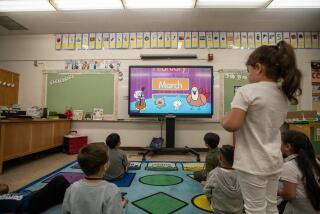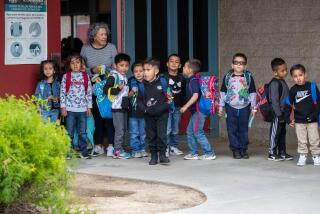‘90s FAMILY : Parents, Teachers Should Be Friends : Education: Frequent, open-minded conferences will help keep the lines of communication open about the child’s classroom progress.
- Share via
Many parents approach parent-teacher conferences with the doomed reluctance of a trip to the principal’s office. But such dread is misplaced, experts say.
“It’s important for parents to remember that this is a meeting with their child’s teacher, not some intimidating teacher they remember from their own childhood,” said Barbara Wahlquist, vice president of parenting education for the California State PTA.
Parents and teachers share a responsibility in nurturing a child’s education. Conferences provide the ideal setting for maintaining open lines of communication between you and the school about your child’s academic and social progress.
“Parents should think of the teacher as a team member, like an extension of the family,” said Diane Watanabe, consultant for the Learning and Thinking Skills Institute of the Los Angeles County Office of Education.
“We are all working toward the same goal in helping that particular child achieve his or her best,” she said. “Parents should approach the teacher as a friend. Conferences should be beneficial to everyone involved.”
Watanabe said studies find a direct relationship between a child’s emotions and how well he learns. So parents need to ask not only about academics, but how happy the child is at school. Does he associate well with his peers?
Most Southern California school districts schedule at least two conferences each school year, but educators and parental advocates alike encourage parents to meet with teachers as many times as necessary to track a student’s progress.
“Many parents think they can only go to the school when they are called,” Wahlquist said. “That’s just not true.”
Want to make the most of your meetings with the teacher? Here are some suggestions from parents and educators:
* Get to know your child’s teacher early in the year.
* Discuss the conference ahead of time with your child and take a written list of concerns you both have.
* If possible, both parents should attend.
* Go to the conference open-minded regarding suggestions and observations made by the teacher. Try to understand, not react.
* Be an advocate for your child. You know your child better than anyone else. Take time to think about your child’s strengths and weaknesses and share these thoughts with the teacher.
* Report to the teacher any significant news from the home front that may affect your child’s schooling.
* Let your child attend the conference with you. This avoids conflicting viewpoints between teachers and students and keeps things open and honest. It also lets your child play a role in problem-solving. If your child cannot attend, discuss the conference when you get home.
* Find out the teacher’s attitudes about homework and share your own beliefs.
* If you need an interpreter, ask the school to provide one for you.
* Don’t be afraid to ask the teacher to explain terms you don’t understand.
* If your child experiences difficulties in school, ask the teacher for a weekly report and agree to a follow-up conference within six weeks.
* Be a good listener and stay calm.
More to Read
Sign up for Essential California
The most important California stories and recommendations in your inbox every morning.
You may occasionally receive promotional content from the Los Angeles Times.













